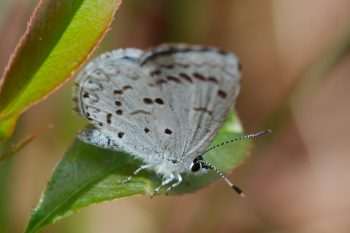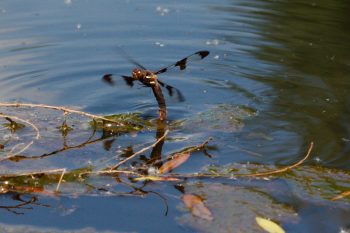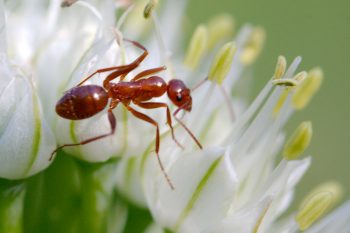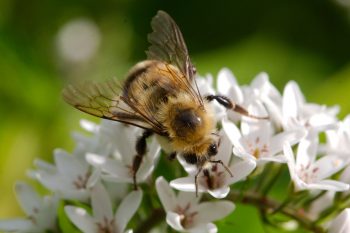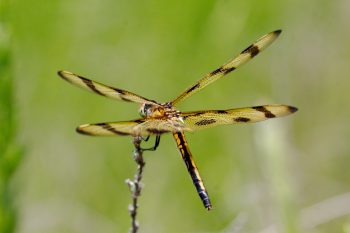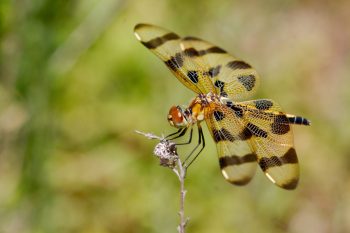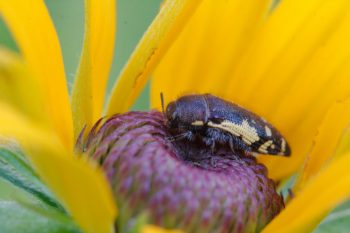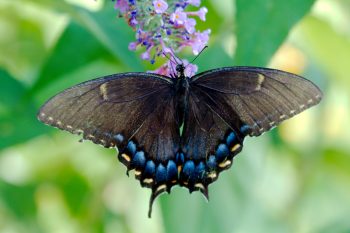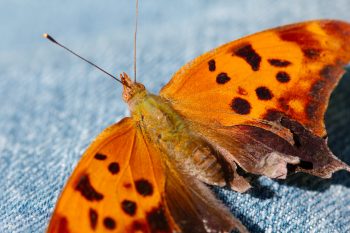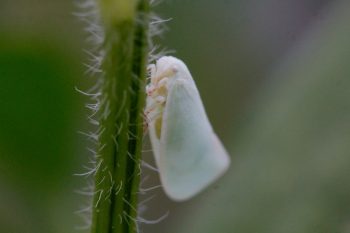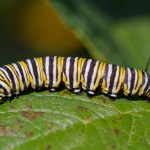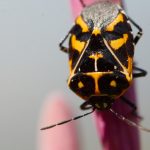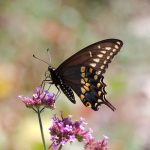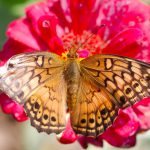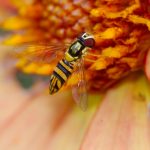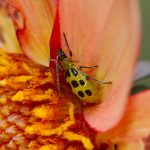I saw my first butterfly of the year today. I know there are generally some out even earlier than this, but this is the first I’ve spotted. I’m pretty sure it’s an azure (Celastrina sp.) but the various species are difficult to tell apart and I’m not even going to try to figure out which it is. It’s a pretty, little thing, with a wingspan of only a little over an inch. This is a small butterfly and it took a bit of patience to get close enough to get this photo. Still, it was nice to see and the harbinger of things to come. As you know, if you’ve followed my work for any length of time, flowers and insects are two of my favorite subjects for photography and we’re coming into the best time for both.
Tagged With: Insects
Azure (Celastrina sp.)
Ant
I took some pictures of flowers and plants in the back yard this evening. I had gotten down onto the ground to see if I could get a good picture of a syrphid fly on an allium flower. I got a few pictures but they weren’t as sharp as I would have liked. Then I noticed this ant on another allium and got a handful of pictures of it. They aren’t all that sharp, either, but will have to do, because I didn’t really get anything better. I’m pretty happy with the framing of this picture and the exposure, but the focus isn’t that great. In my defense, this little fellow was moving around quite a bit and the light was starting to wane a little.
Eastern Bumble Bee
I went out looking for pictures as usual this afternoon, when I got home from work. There is Campanula in bloom in the yard, and I took some pictures of those flowers. They don’t tend to come out the same color in photographs as they are in real life. Not entirely sure why. Then I moved over to the gooseneck loosestrife (Lysimachia clethroides), which is a real attraction to the bees. It’s quite invasive and I really would recommend against planting it in the strongest language, but if you already have it, you might as well enjoy the bees. There were a few honey bees but mostly it was the common eastern bumble bees (Bombus impatiens) that were moving quickly from flower to flower.
Halloween Pennant (Celithemis eponina)
I went out to the vacant lot next to my office today. It was quite warm but the weather patterns promise hotter weather ahead. I got a few pictures of an orbweaver spider (Leucauge venusta) but since I posted one of those recently, I’ve decided to go with this pennant, probably a calico pennant (Celithemis elisa). I also got one, not so good photo of a tailed blue, but I’m holding out for a better picture before I post one of those.
Note: I labeled this as a calico pennant (Celithemis elisa) without paying close attention to detail. I’m relabeling it as a Halloween pennant (Celithemis eponina).
Halloween Pennant (Celithemis eponina)
I know I’ve posted a picture of a similar dragonfly recently, but I didn’t get a lot of great pictures today so this is what I have. This is also, I think, a better picture than the one previously posted. I had originally labeled that one as a calico pennant (Celithemis elisa) but I’ve rethought that and have relabeled it as a Halloween pennant (Celithemis eponina), the same as this one. It’s a handsome dragonfly, whatever it is. I had tough time getting close enough for this picture, so I’m relatively pleased with it.
Acmaeodera pulchella
I went out to photograph flowers this evening but came across this metallic wood boring beetle (family Buprestidae) on a black-eyed Susan. There are twelve dozen species of Acmaeodera in our area and one of the experts at BugGuide.net identified it as Acmaeodera pulchella, sometimes known as the flat-headed bald cypress borer. We’re not really in bald cypress country but they feed on a pretty wide variety of trees, so that’s not really an issue.
Papilio glaucus (Eastern Tiger Swallowtail)
This is a dark-morph (and thus a female) eastern tiger swallowtail (Papilio glaucus) on the buddleia outside our kitchen door. The tiger swallowtails are the most numerous, large butterflies in our garden, followed by monarchs (Danaus plexippus). Otherwise, we only have occasional visitors. There are a lot of smaller butterflies and skippers, particularly small skippers. But the large, gaudy swallowtails are fun to watch and among my favorites.
Polygonia interrogationis (Question Mark)
I stopped at Lake Needwood this afternoon to see what I could see. It’s gotten quite hot, with the forecast for hotter still by the end of the week. The butterflies and dragonflies like that sort of weather, and they were out in pretty good numbers. I happened to spot this question mark (Polygonia interrogationis), so called because of a roughly question mark shaped mark on the underside of their hindwings. I got one photo of the butterfly on a shrub and then if flew and landed on my thigh, thus the blue denim of my jeans. I was able to get a few pretty good photos, including this one. I also got one showing the question mark, but I think this is prettier.
Northern Flatid Planthopper (Flatormenis proxima)
I took a few pictures of butterfly weed flowers this evening and I might have posted one of them. A little later I noticed this white leafhopper and got a few pictures of it, including this reasonably sharp image. Getting a good picture was made more difficult by the breeze, which was moving the stem the planthopper was on, but this one turned out pretty well. It was sharp enough for it to be identified as a northern flatid planthopper (Flatormenis proxima), one of our more common planthoppers. They do little damage and I left him alone to get what he needed from this plant.
Insects
I went on a short outing this afternoon to the Agricultural Farm Park today and spent a little time wandering around the Master Gardener’s display garden. Mostly I photographed insects (and a few flowers). It was a pretty productive outing as far as insect photos go.
- Danaus plexippus (Monarch) Caterpillar
- Murgantia histrionica (Harlequin Bug)
- Papilio polyxenes asterius (Black Swallowtail)
- Euptoieta claudia (Variegated Fritillary)
- Allograpta obliqua (Common Oblique Syrphid)
- Diabrotica undecimpunctata (Spotted Cucumber Beetle)
I’m particularly happy with the oblique syrphid fly, as that’s the first one I’ve photographed. The black swallowtail is one we don’t see nearly as often as the eastern tiger swallowtail. I’ve seen harlequin bugs on occasion but not all that often. The same is true of the cucumber beetle.

